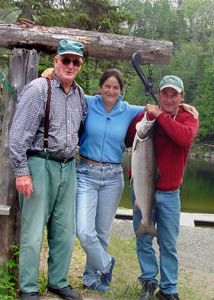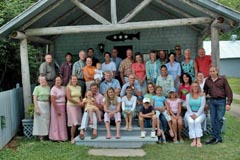
A portageur canoe, which is what Wesley called it, “Not a Bonaventure and not a Gaspe,” is a broad-bottomed and commodious river craft big enough to carry nets and rain gear, light enough to be driven by a small outboard, and lithe enough to slip along quietly in the river from drop to drop, as the precise settings of the killick or anchor are called. This task calls for a bowman, in this case a cheerful young Canadian named Jeff, who deferentially helped Wesley move the boat through its daylong ballet on the rapids and meanders of the great river.
I was warned that if I did not fish seriously the entire time that we were on the river, if I repeatedly misstruck fish or failed to turn over my leader in the wind, Wesley would return to shore and put me off the boat. He has taken more than one sport in early with the recommendation that he go elsewhere to learn to fish before coming back. I was turned up by such admonitions forty years ago on the Pere Marquette River by my father and my “uncle” Ben Ruhl, and there was a certain solace in having the majesty of a great river presumed as a place of seriousness, if not solemnity. These men grew up before the advent of Jet Skis and other entertainment doodads of this dubious age. The river was your greatwife and the very hem of her skirt must be honored.
I rose from bed in the wonderful music of birds in the forest surrounding the camp. To my western ears, the sliding notes of the redstart made a summery mystery. I thought of the warm haze in the skies, the nearness of the sea, the plain thrill of fishing for strong North Atlantic Ocean fish whose legend required their seasonal presence in what otherwise was a woodland trout stream. The mind of an angler is stretched to account for this.
I had breakfast with my hosts, who took very good care of me with homemade pastries and jams, tawny local bacon and farm eggs. I gathered my rod and sweater, a book of low-water salmon flies on Partridge Wilson-style hooks, same hard candy to suck on at tense moments, then walked across fields of wild strawberries swept by a warm, balsamic breeze. My only fears were that I would be struck by lightning or that news of a world war would come over the little radio in the kitchen or thatWesley would kick me out of the canoe.
Whereupon, I met the man himself and his bowman, Jeff. Wesley Harrison was a tall, strongly made, and cheerful man in his seventies, flannel sleeves rolled over arms that had poled his canoe thousands of miles. Jeff was that rare, quick-witted youngster without a phony bone in his body. He kept an eye on Wesley to be sure of the right syncopation of effort.
The river was a little dark and I mentioned this to Wesley. He shook his head faintly. “Not good,” he said. “The old Indian calls this poison water.” We pushed off and started the motor. Sitting in the middle of the canoe, I rested my fingertips on the fly rod I’d laid across the thwarts. I kept one eye on the unscrolling river behind and one on Wesley, whose billed cap shifted left and right as he sized up our course.
We passed another canoe with two Mic Mac Indians guiding a well-dressed sport who failed to acknowledge our passing. “Oh, that old Indian feller there now,”said Wesley, “he’s quite comical. I asked him yesterday if they were catching anything and he called out, ‘Nothing! Fisherman no good!’ He‘s a comical one, that one.”
Wesley shut the engine off and tilted it on the narrow transom. Then he grasped the paddle and, finning it skillfully alongside the ribbed hull, eased us silently downstream to the head of a long pool. “Let’er go, Jeff,” and our bowman dropped the iron.
The canoe settled into a stop as the Grand Cascapedia whispered past the hull. “No shipwrecks with a lad like Jeff,” said Wesley. He thought for a moment. “If we drowned, poor old Jeff’s girlfriend would be running up and down the riverbank crying her heart out.” Jeff was gazing at the sky and I got the feeling this had been going on for a while. Then, to me: “We’ll fish this one to the right.”
I thought of my host’s father sitting one previous evening deep in a chair on the screened porch above the river, reciting Izaak Walton: “When the sun is bright and the moon is right, the fish will bite. Maybe.” And the great proverb of my Celtic forebears: “It’s better to be lucky than to rise early.” All sorts of things run through mind when you look at new water, especially great new water with all its manifold concealments and prospects. This really was a fine pool, cut out of stone and the roots of old trees, with a long, deep run trembling down its center. The water was tea-dark from alder stain but clearing rapidly.
|
|

From left: Archie, Kirk, Marilyn, Sally, Stacey
In the background is WESLEY'S POOL, formerly Lamour's Rock |

| A family photo during a luncheon at Lorne Cottage in July 2005 in celebration of Wesley Harrison. |
I cast my fly, a Green Highlander, in widening arcs, extending one arm’s length of line per cast until I’d reached my longest distance, under Wesley’s hawklike gaze. I reeled up, thus signaling Wesley to resume his crouch at the gunwale with his paddle and Jeff to lift the kellick, as we moved to the next drop. The current here was different and Wesley kept his paddle in the water to control the yaw of the canoe.
We resumed conversation. I had for example, noticed a small valley that stood at an angle to the river. “Oh, a tough life there,” said Wesley, “more mealtimes than meals.” I murmured – I thought compassionately – but did catch a glint in Wesley’s eye. “There‘s an old feller up there so poor he has to take his dog down to the gate in a wheel barrow to bark at strangers.”
While I burned a hole in the river looking for a moving shape under my fly, Wesley told me about a Frenchman who lived nearby, a high-spirited man whose wife had twins. When Wesley inquired about the babies, the Frenchman replied in a heavy accent as imitated by Wesley, “Oh they‘re cute little things but they’re an awful bother.”
I fished this drop very slowly, thinking we were in the heart of the matter. Every so often, a seagull flew overhead reminding me of the ocean not so far away but somehow unimaginable in this beautiful sweetwater stream. At the bottom of the pool, the river went through a cleft in the rock and I thought that must be the end of it. Wesley stared at the pool as my line moved on top of the current. “What’s the matter, Mr. Salmon? A hot day like this, we’ll put you in the cooler and save you the trouble of swimming all the way upstream.”
We discussed life in Cascapedia, a small place which, like all places, had most of the world’s problems, even drugs. “Fine young fellers,” said Wesley, “good fellers get on these drugs. Couple of months they look like they crawled through a knothole.” And, of course, nature: “The Old Indian says the hummingbird goes south by getting into the feathers of the wild goose.” He looked at me and shrugged: maybe, maybe not. Then he apologized in case the bowman seemed a bit sleepy. Late night with the girlfriend.
At that moment, an astonishing thick shape sucked a section of water down around my fly and I hooked a salmon. My reel screeched at the first run and then with wonderful power as the fish vaulted high over the surface of the pool. I got my fingers inside the arbor of my reel to slow things down, though it was clear the fish wasn’t going to be entirely under control for some time. Another jump, this one sideways in a real rip. Without my noticing, the kellick had been weighed and now Wesley was slipping us over to the gravel bar opposite the pool. I got out to fight the fish while Wesley readied the net and Jeff slid the canoe ashore. Then the fish jumped again and broke the leader. Wesley walked over to me, looked at my straight rod. For a moment all was silent. Then he asked, quite coolly I thought, “What happened?”
Now he wanted to examine my tackle. The leader, a finely tapered thing, he actively disliked. O buried my own views of leaders and took one of his, tied on another fly, and began fishing the drop below the one where the salmon, a big salmon, had taken my fly. I knew how it was. The next take could be a week away. There was a cavernous silence in the canoe. I resumed my methodical fishing of the drop, cast, lengthen, cast, lengthen. The waterspeed was picking up lower in the pool and required more careful mending of the line. I kept seeing the fish in the air, hearing the erratic screech of the reel, feeling that slump as the dead rod straightened.
But now I hooked another fish, a hard-running ocean-bright fish, and this one, after several wonderful leaps, ended up in Wesley’s net, a big deep-hanging silver arc. With a wide smile that confirmed my absolution, Wesley said, “A fresh one, right from the garden!”
We bounced along the river toward camp, tall ferns thrust through the gunwales to announce our fish. When we landed, Wesley shook my hand and said he’d see me in the morning. “You can’t leave us now,” he told me. We’re well acquainted from fighting the salmon together!”
I headed back up through the banks of wild strawberries considering a nap, the river poems of Michael Drayton, considering the notion that no one owed me anything. (The end)
|
|









